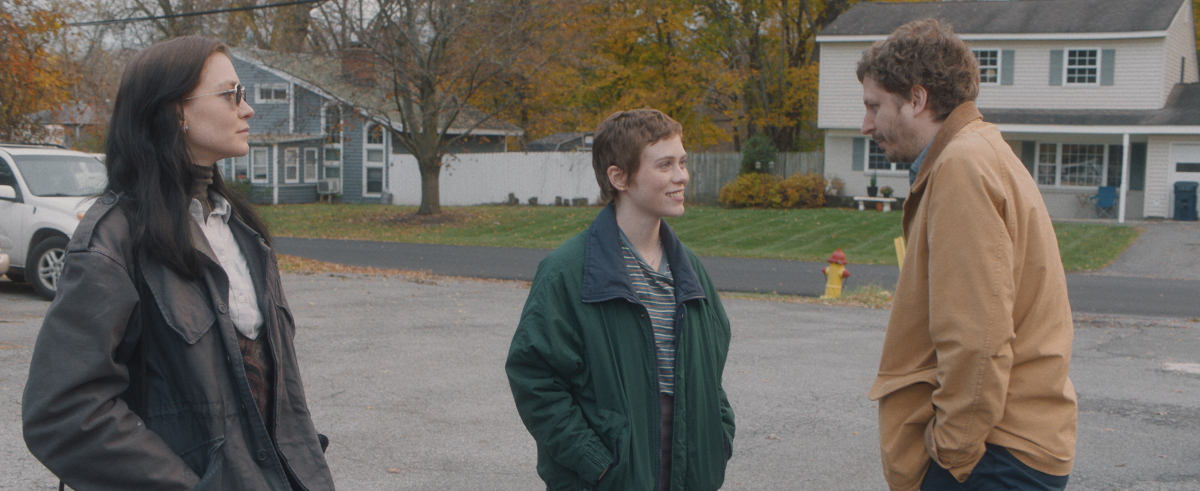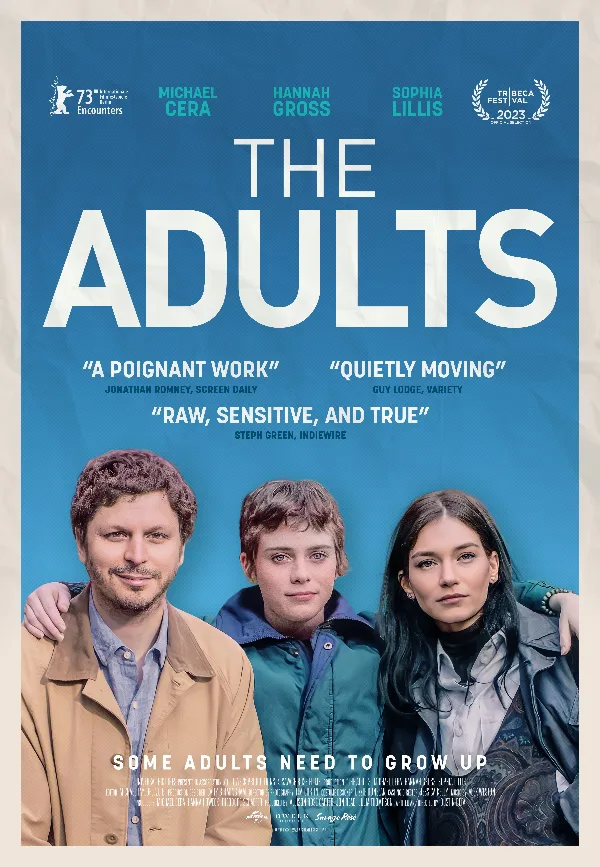Michael Cera does an impeccable Marge Simpson impression midway through Dustin Guy Defa’s “The Adults” in a scene in which his character, a vengeful poker player named Eric, doesn’t want to say what he’s really feeling. It’s a defense mechanism Eric shares with his siblings, the similarly aged Rachel (Hannah Gross) and the younger Maggie (Sophia Lillis). They can all do different cartoonish voices. The siblings also sing original songs and dance, with some scenes of their stressful but low-key reunion within “The Adults” suddenly breaking into reams of lyrics and coordinated hand jives, remnants of a creative bond these siblings once shared. Now it’s a way in which they don’t actually talk to each other.
“The Adults” has many scenes with strange voices and random song-and-dance numbers, and each time it’s a brilliant, animated interpretation of how family bonds can seep into superficiality. Trying to make people laugh instead of letting them see the authentic you; going through the motions, no cues needed. “The Adults” is perceptive and funny about this throughout in a way that is anti-razzmatazz just as much as it is anti-twee. Writer/director Defa and his three excellent performances present this “quirky” family trait without a trace of irony.
The movie’s premise is overly, perhaps knowingly familiar—Eric returns home for the first time in years and faces the people and pain he left behind. Rachel is not amused, feeling the burn of Eric’s disappearance and detachment. He doesn’t consider all that Rachel has shared in brief communications about her past woes (about her ex, about their mom dying, about her inheriting the family house); he doesn’t fully grasp how funereal she has become, adorned in different shades of black and with her clothes always covering her neck. But he does criticize her for not being as fun as she used to be. Gross captures how exhausting it can be in Rachel’s shoes, illustrating her resulting defensive nature with a tragic coldness.
Eric makes the visit home all the more teeth-gnashing for Rachel by saying it will be short. Eric even lies about what else will be keeping him busy on the trip and insists on staying at a hotel despite his two sisters living nearby. He has such low bandwidth for his family that he pretends to take a call during a bowling trip and goes to the claw machine instead.
Rachel is worried about what Eric’s reemergence will do to Maggie, who is extremely excited to see her older brother, and unaware that he’s mostly in town to win poker games, extending his stay each night to maintain a hot streak. But Maggie lacks Rachel’s cynicism, at least for now, and is closer to the golden days of the siblings before loss and distance broke up their band. She got the memo to speak in monotone during this uncertain reunion, and yet Maggie is the first person to break into song as they sit in the backyard of the family home, with Eric eventually joining her. She is the source of the movie’s tightest hugs. Lillis’ performance, her giddiness cracking through the solemnity that comes with such dysfunction, is full of worrisome vulnerability and warming energy.
“The Adults” is a triage of dynamic characters, and its version of a “villain” helps the story become all that more distinct. Michael Cera has been absent from lead movie roles for a couple of years, but in the role of Eric, he returns with an intriguing intensity and is well in control of his sometimes novel presence (as in “Barbie”). There’s a striking, alarming uncertainty to the scowl he reveals when the sister hang-out isn’t working for him or when he’s doing that Marge Simpson accent. At night, when playing poker, he further reveals Eric’s smug need for admiration but layers it with increasing uncertainty about his true story. It turns out that Cera’s cameo in Aaron Sorkin’s poker story “Molly’s Game” (as “Player X”) was no fluke; he really does have the chops for mind games and limited tells. It’s one of his best performances yet, and it’s fitting for a movie that encourages you to read all faces closely.
Defa’s film aligns with the notion that it’s how a story is told—how it feels—and not just what it is about. And there is so much to feel from his take on dysfunction, including how it presents siblings who can sing and dance in unison but are not friends. “The Adults” is defined by such crucial touches: even the incredible, jazzy score by Alex Weston is careful with its flute and piano as if trying to tiptoe around the story’s awkwardness. Wide shots from Tim Curtin’s cinematography of Rachel and Eric standing across from each other, both marooned in the same frame, couldn’t be more painful. Watching Eric join his sisters in a dance routine later on couldn’t be more hopeful, however bittersweet.
Now playing in theaters.




















